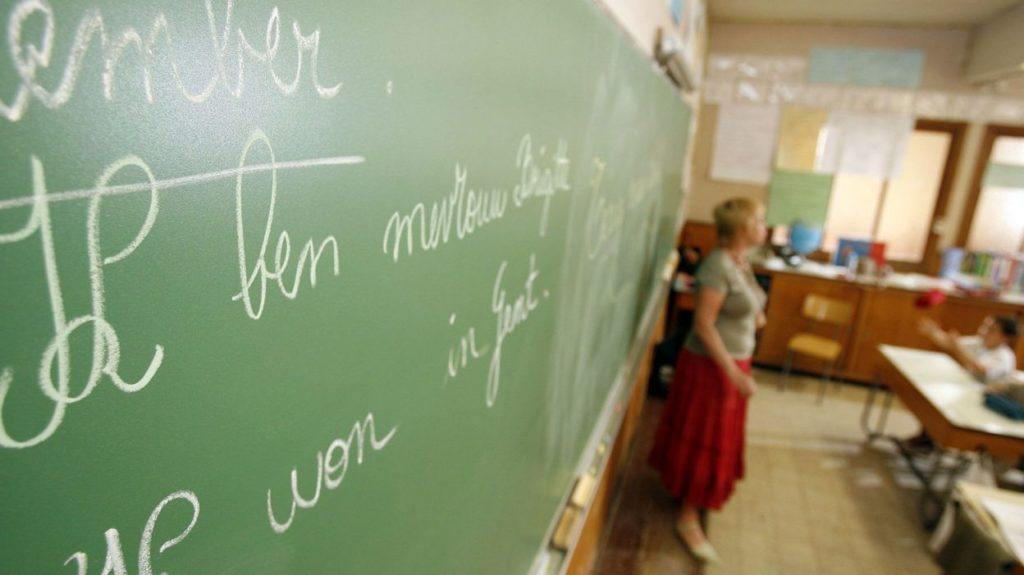Suggestions made on Tuesday by Flanders' Education Minister to punish parents of young children with insufficient Dutch language skills have drawn heavy criticism from politicians and the region's family association.
The latest Language Screening of five-year-old children in the third kindergarten class published by Flemish Education Minister Ben Weyts on Tuesday showed that 14% of children born in 2017 need additional language support in Dutch. It noted that language deficiency was worst in schools where many of the pupils speak a different language at home.
"I don't want children starting in the first grade with insufficient knowledge of Dutch. Otherwise, these children will not have equal opportunities at all. Moreover, it weighs on the quality of education for all children if there are many pupils in the class who do not have a sufficient command of Dutch," Weyts said.
Weyts wants to stimulate parents with positive measures but is also in favour of repressive measures.
"We need to think about possibilities to intervene when parents are manifestly shirking parental responsibility, for example intervening in the Growth Package [a package of financial allowances tailored to each child in each family which replaced the Child Benefit system] or government premiums."
Criticism from all corners
Flemish Youth Minister Benjamin Dalle was among the first to speak out on the plans to sanction parents whose children score poorly on Dutch language skills.
"We need to encourage parents and children to learn Dutch well, for instance by lowering thresholds to leisure activities. Those who impose punishments will reduce rather than increase children's (practice) opportunities, which is not in the interest of the child," he wrote in a Tweet.
The region's Welfare Minister Hilde Crevits also disagreed with the idea to punish parents financially because their child fails a test.
Tweet Translation: "Punishing parents financially because their toddler fails a test is not a good idea. It will increase vulnerability (and language deficits). The Growth Package is just there to give parents and children more opportunities."
Open VLD MP Gwendlyn Rutten also took to Twitter to express her annoyance with the statement, saying Dutch is important, but so is freedom.
"At home, you speak the language you want, you say what you want in the language you choose. I pass for a society that fines if mothers/fathers speak a language with their children that the state does not like."
Co-chair of the opposition party Groen (Flemish Green Party) Nadia Naji is also not in favour of the proposed measures, saying Weyts should not start making up his own conditions for the allowance that every child is entitled to.
Related News
- Teacher shortage poses biggest threat to school performance
- Pandemic pushed one in five teachers to early retirement in 2021
"Instead of providing the necessary support for children who need extra support, the minister is now looking for a stick to beat the parents. Unheard of," Naji said.
Unsurprisingly, the right-wing Vlaams Belang party does favour the repressive approach, stating it advocates "depriving parents who refuse to make efforts to master Dutch of social benefits and allowances." The party's Flemish MP Jan Laeremans said intervention is needed and that he will question Weyts on the matter in parliament.
Important support
The Growth Package that Weyts targeted is a necessary addition to many families' incomes. The bulk of families add the amount they are awarded to their general income, meaning it is a very important support for families, the region's family association Gezinsbond stressed.
"For us, the growth package should therefore remain an unconditional right," Jeroen Sleurs, general director of the Gezinsbond, told Belga News Agency.
Already last year, the organisation criticised the fact that the 2019 child benefit reform involved savings. Whereas the former child benefit system was linked to the pivot index, the growth package was only increased by 2% annually in September. Last September, additional savings were made, resulting in the Growth Package increasing by just 1%.
"Not linking it to the pivot index already made the growth package a shrinking package. The possible curtailment by punishment, on top of that, makes it a punitive package," Gezinsbond noted.

